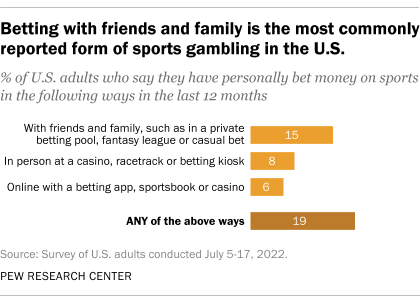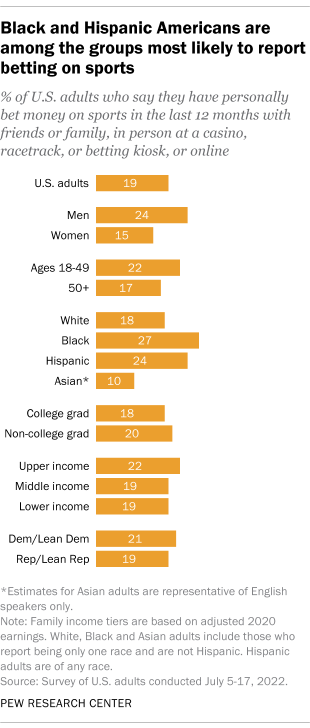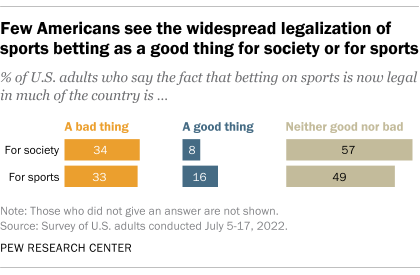
Around one-in-five U.S. adults (19%) say they have personally bet money on sports in some way in the last 12 months, whether with friends or family, in person at a casino or other gambling venue, or online with a betting app, according to a new Pew Research Center survey.
The survey comes more than four years after the Supreme Court effectively legalized commercial sports betting in the United States. As of this month, 35 states and the District of Columbia have authorized the practice in some form, with Massachusetts becoming the latest state to do so in August.

Despite the growth of commercial sports betting in the wake of the Supreme Court’s 2018 ruling, the most common way that Americans bet on sports is with friends or family, according to the Center’s survey, which was fielded July 5-17 among 6,034 adults. Some 15% of adults say they have bet money on sports with friends or family in the last 12 months, such as in a private betting pool, fantasy league or casual bet. Smaller shares say they have bet money on sports in person at a casino, racetrack or betting kiosk in the past year (8%) or that they have done so online with a betting app, sportsbook or casino (6%). All told, 19% of adults have bet money on sports in at least one of these ways in the past year.
The U.S. Supreme Court decided in 2018 to effectively legalize commercial sports betting in the United States. Pew Research Center conducted this analysis about four years later to find out what share of U.S. adults have personally bet on sports in the past year and to understand Americans’ broader views about the impact of sports betting on society and sports.
The analysis is based on a survey conducted July 5-17, 2022, among 6,034 U.S. adults. The poll included 4,996 respondents from the Center’s American Trends Panel (ATP), an online survey panel that is recruited through national, random sampling of residential addresses. This way nearly all U.S. adults have a chance of selection. It also included an oversample of 1,038 respondents from Ipsos’ KnowledgePanel. The survey is weighted to be representative of the U.S. adult population by gender, race, ethnicity, partisan affiliation, education and other categories. Read more about the ATP’s methodology. Here are the questions used for this analysis, along with responses, and its methodology.
This survey includes a total sample size of 234 Asian adults. The sample primarily includes English-speaking Asian Americans and, therefore, may not be representative of the overall Asian adult population. Despite this limitation, it is important to report the views of Asian Americans on the topics in this study. As always, Asian adults’ responses are incorporated into the general population figures throughout this analysis.

Men are more likely than women (24% vs. 15%) to say they have bet on sports in some form in the past year, as are adults under the age of 50 when compared with those 50 and older (22% vs. 17%). There are also differences by race and ethnicity: Black (27%) and Hispanic adults (24%) are more likely than White (18%) and Asian American adults (10%) to report doing so.
There are no significant differences in self-reported sports betting by educational attainment or household income level. For example, 18% of college graduates say they have bet on sports in some way in the past year, as have 20% of non-college graduates. Similar shares of adults in upper-income (22%), middle-income (19%) and lower-income households (19%) say they have bet on sports in the past year.
There is also no significant difference by party affiliation: 21% of Democrats and Democratic-leaning independents say they have bet on sports in some way in the last 12 months, as have 19% of Republicans and Republican-leaning independents.
Public awareness of legal sports betting
Overall, 56% of adults say they have read or heard a lot (12%) or a little (44%) about the fact that sports betting is now legal in much of the country, while 44% say they have read or heard nothing at all about it.
Awareness of legalized sports betting varies by demographic group. Men are far more likely than women to say they have read or heard at least a little about it (69% vs. 44%). Americans ages 50 and older, those with a college degree and those in upper-income households are also among the groups who are more likely to have read or heard about it.
Perhaps not surprisingly, Americans who have read or heard a lot about the widespread legalization of sports betting in the U.S. are far more likely than other Americans to say they personally have bet on sports in the past year. Among this group of Americans, nearly half (46%) report betting on sports in some way in the past year, compared with 23% of those who have read or heard only a little and just 9% of those who have read or heard nothing at all about the fact that sports betting is now legal in much of the country.
Perceptions about legal sports betting’s effect on society, sports
The widespread legalization of sports betting has created a new revenue stream for many state governments, but it has also raised concerns about gambling addiction and other societal harms.
So how do Americans feel about the fact that sports betting is now legal in much of the U.S.? Regardless of how much they have heard or read about it, a majority of adults (57%) say it is neither a good nor bad thing for society, while about a third (34%) say it is a bad thing. Only 8% say it is a good thing for society.

The public is slightly more divided on a separate question about whether the widespread legalization of sports betting is a good or bad thing for sports. Around half of Americans (49%) say the fact that sports betting is now legal in much of the country is neither a good nor bad thing for sports, while a third say it is a bad thing for sports and 16% say it is a good thing.
On these questions, too, there are some demographic differences. Americans 50 and older are more likely than adults under 50 to say that legalized sports betting is a bad thing for both society (41% vs. 27%) and sports (38% vs. 29%). College graduates and those in upper-income households are also more likely to see the widespread legalization of sports betting as a bad thing for both society and sports.
While there are no significant partisan differences on most of the Center’s questions related to sports betting, one such divide does appear on the question of whether legalized sports betting is a good or bad thing for society. Republicans are slightly more likely than Democrats to say this is a bad thing for society (38% vs. 31%). Still, more than half in both groups (54% of Republicans and 59% of Democrats) see it as neither a good nor bad thing for society.
Note: Here are the questions used for this analysis, along with responses, and its methodology.